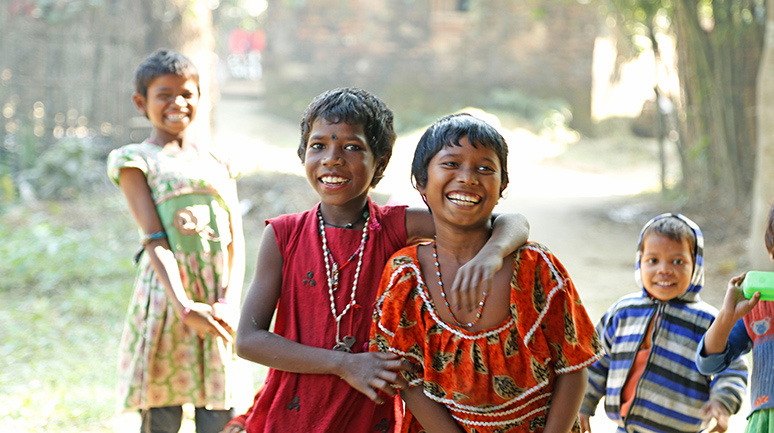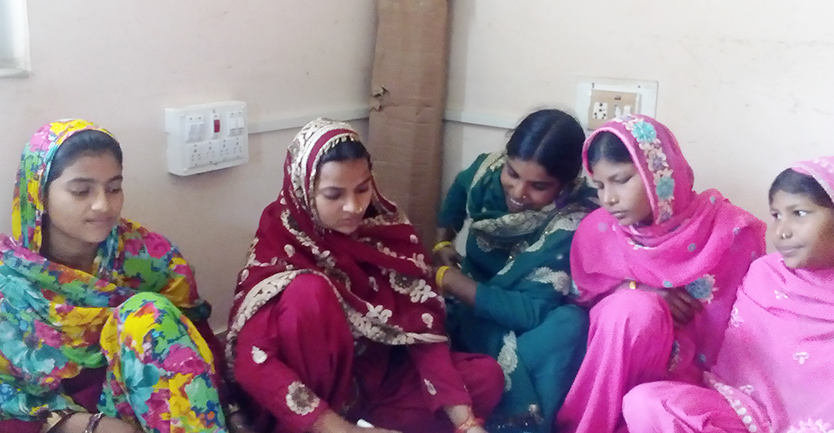Sehansha Gets Married


"Expressing her anguish at customs and cultural practices that are blindly followed, a young 14-year-old bride’s gut-wrenching questions remain unanswered: “Why does the world have so many expectations from women? Why do we have to listen to abuses all day, even after killing ourselves to match up? My husband doesn’t like to come to my mother’s house, but why I am expected to live with his mother?”
T he sun in June is ruthless as it beats down on the upper plains of Bihar; usually, there is an uncanny quiet because not even a bird dares to venture out into the scorching heat. Today, however, the hamlet was resonating with loud chatter and giggles as young girls seemed to be celebrating. The cacophony became louder as they spotted me approaching.
My eyes inquired, “What?”
The answer to my silent question was a resounding chorus, “Sehansha is getting married. Today is the ‘turmeric’ ceremony, and tomorrow is the wedding!”
I was surprised. A volley of questions ran through my mind, “What? How? Who is the groom?” I asked them all, one after another. Then I added, curious, “How old is Sehansha?”
An old aunty started to calculate tediously. “The October in the year of the flood, that means…”
Many others joined in the effort. The task was insurmountable! At last they gave up, and the old lady declared righteously, “She is old enough!”
My next question was deceptive. “When do girls become old enough?”
The response was simple, quick, and direct, “When she starts wearing a kurta.” My eyes reflected my lack of conviction with the response.
Pat came the justification: “See, your city and our village are very different. Who will marry a girl who is over-age?” The lady continued. “You know, we won’t be able sleep in peace if our girls grow to be your age and are not yet married…By the time they become your age, they would (should) have had two or three children. We think your Abbu did not have the money to marry you off!” She declared in conclusion. Oh my God! She was a sight to behold with open locks of hair, face glowing with turmeric, eyes flooded with kohl, a golden saree, hands radiant with henna, a shiny stone on her nose and large rings in ears – all in riotous contrast with her fair skin.
Oh my God! She was a sight to behold with open locks of hair, face glowing with turmeric, eyes flooded with kohl, a golden saree, hands radiant with henna, a shiny stone on her nose and large rings in ears – all in riotous contrast with her fair skin.
W ise-cracks such as these have become a part of my daily interactions with these feisty folks. I brushed the comment aside and started admiring the new art work that has come up on the walls of the cow-dung green court - yard. So pretty the sketches were: flowers, men, women, girls…there were also ornamental festoons on the doorway that added to the splendor!
“Where is Sehansha?” I asked.
“Oh, she has gone to take a bath,” her Aunt responded.
I found a seat for myself on a bundle of straw, and settled down to wait. A little while later, Sehansha appeared in the doorway.
Oh my God! She was a sight to behold with open locks of hair, face glowing with turmeric, eyes flooded with kohl, a golden saree, hands radiant with henna, a shiny stone on her nose and large rings in ears – all in riotous contrast with her fair skin.
Getting the congratulations out of the way quickly, I asked, “How is your boy?”
Spreading the wet clothes that she had washed onto the wooden fence, she replied loudly, “Oh that fellow? He is ugly. Black as ink!” The reply was not on expected lines…Was there is a tinge of rebellion in her voice?
“You shameless whore! Bloody slut!! Loose character!” A barrage of shocking expletives… and many more, flowed easily and violently from the old grandmother who was in a rage. “Is this how you speak of your groom? Did your parents not teach you basic civility? Is this your culture?”
Perhaps, Sehansha had crossed the Lakshman rekha of conformity somewhere. The old women in the group joined in the melee and abused her to their satisfaction, happy to have won one more fight against change.
Sehansha was in tears as she made herself busy doing nothing in particular. I sneaked her away to another room. Slowly, she became cheerful. She displayed her new necklace and the ear- rings, and asked, “How do I look?”
“Gorgeous!” I said, smiling.
There was a movement outside...Sehansha’s father had returned from the field. In spite of being a farmer, he had gone for weeding in the landlord’s field, as his own land had been mortgaged away.
I stepped out of the room, and asked Sehansha’s mother, “So, how are you preparing for the wedding?”
The heat was debilitating. Swinging the grass- fan even more vigorously, she replied gloomily, “What do I tell you? We haven’t even bought new clothes and nor have we arranged for the feast. We need a lakh and a quarter, and we have managed only seventy thousand, as of now. There are more landlords whom we could ask, but I don’t know how we will work on so many fields.” My eyes kept returning to the father. The frail man was a picture of dejection and despair. He listed the details of the bridal-gifts, “Bed, bedding, table, chair, almirah, motor-cycle, utensils, new clothes; then there are the other routine expenses—the music band, mutton— the list is long. We need at least a lakh and a quarter.” He sighed
My eyes kept returning to the father. The frail man was a picture of dejection and despair. He listed the details of the bridal-gifts, “Bed, bedding, table, chair, almirah, motor-cycle, utensils, new clothes; then there are the other routine expenses—the music band, mutton— the list is long. We need at least a lakh and a quarter.” He sighed
As we chatted, a few persons from Sehansha’s sasural (husband’s family) came visiting, to hand over the customary wedding invitation; along with the card, they left behind a new demand: “Include a calf in the list of gifts.”
Sehansha’s father turned pale; and he rushed off to the market.
Evening set in. It was time for me to return home. Each of the family members invited me for the wedding. Sehansha walked me to the gate. She complained, “I am sick of all this. I am supposed to eat sweets and not drink any water! I can’t do this.”
I listened to her for a while and then left.
My mind was distraught as I travelled back. Where would they arrange the money from?
I remained busy for the next few days and was not able to go for Sehansha’s wedding. I called her Amma later, to apologize. “All well? Sehansha has gone off to her in-laws?”
“All well,” said Amma. “You must come to meet all of us.”
I went to the village after a few days. All the girls came and assembled around me.
Sehansha was also there. She brought a chair for me, but did not seem to be in high spirits. She looked different; her attire was not her usual one. I asked the reason.
She replied dispiritedly, “My husband likes me wearing long kurtas.”
Sehansha’s friends (Sahista, Sadia, Ruhi, Bastari, Afroza, Rukhsana, Takallum), all of 13 or 14 years of age, had a lot to tell me.
“Oh, you should have come for the wedding. You know, Sehansha fainted at her bidai (farewell). She was crying non-stop.” They told me excitedly.
“Why? Why did you cry so much?” I asked.
“I cried because of the bangles sent by my in- laws,” she replied.
“What?” I was taken aback by the strange reply.

“The bangles and ear-studs that they gave were ugly; I have never worn such bad-looking bangles ever in my life; also I was famished and thirsty; I wasn’t allowed to even take a bath before leaving, in this heat, imagine! Abbu also could not arrange for the calf that they had demanded; My friends were not there with me, with whom I have played all my life. I was alone; The sweet (kheer) that I was to carry with me was not there; You know, on top of it, my husband—he is a big man—was scolding me for no reason, and I was scared of him. I cried and cried loudly, hoping that Abbu would stop me from going, but no one stopped me,” she wailed. Her throat was choked up and her eyes filled up. There was an avalanche of tears. And between her sobs, she let out her woes: “It is like I am in a prison.
Her throat was choked up and her eyes filled up. There was an avalanche of tears. And between her sobs, she let out her woes: “It is like I am in a prison.
I was shaken, I had not expected this. How many reasons could a young girl have to cry on her wedding day? I had never thought about that before.
I asked the obvious, “How is your sasural?”
Her throat was choked up and her eyes filled up. There was an avalanche of tears. And between her sobs, she let out her woes: “It is like I am in a prison. There are restrictions on everything. I can’t lift a finger without someone scolding me. They are annoyed with me for not bringing the calf. I am forced to go on a fast every other day for some or the other ceremony. I have never seen my husband fasting for anything. No one cares about me! Even for food, I have to ask; otherwise I will not be given food.”
Then she looked at me and asked in all innocence, “Why does the world have so many expectations from us women? Why do we have to listen to abuses all day, even after killing ourselves to match up? My husband doesn’t like to come to my mother’s house, but why I am expected to live with his mother?” She took deep breath and continued, “Remember, you had said that the meaning of my name is, ‘a person who lives by her will’? But today, I have no voice in anything that I do!”
There was a heavy silence in the room as she finished speaking. The girls were not chattering anymore. All the rhetoric of equality, a good life, I realized, had just been blown to smithereens. I was uneasy. It was as if something had broken inside me as well. I wanted to say something to her, I wanted to respond to her, but I didn’t know if I should. I was not sure if what I had to say should be told to a young 14-year-old.
The girls came to see me off as I left. Sehansha did not. So much had changed. It was, as if in an instant, Sehansha had grown up. There were restrictions on her now. She was an adult woman. She was now the wife of Mohd. Parvez.
Narendranth Damodaran is the Executive Director of PRADAN.

